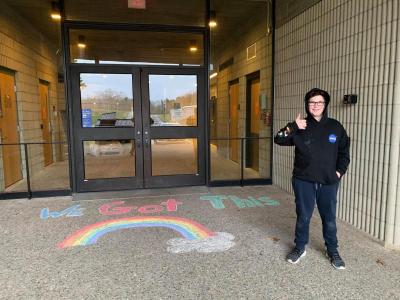Middle School student puts tech skills to use for front line workers
Story Location
United States
Tyler Ferreira is no ordinary 13-year-old.
For one thing, he has a 3D printer — which he assembled out of the box himself at the age of 12.
For another, he has been using his newfound 3D printing skills to help the coronavirus effort by making mask extenders. The extenders hold mask straps in place, making protective equipment more comfortable for front line healthcare workers during long shifts.
Ferreira said that thus far he has made around 80 extenders — all donated to his father’s coworkers at Beth Israel Deaconess Medical Center in Boston.
After tweaking the design and materials for updated versions, he plans to churn out around 25 per day for donation to Beth Israel as well as local hospitals, like St. Luke’s.
“As much as I can supply, they’ll take,” he said of the demand.
Ferreira originally got into 3D printing in order to add homemade modifications to nerf guns.
He ended up falling in love with the technology. “It really just lets your imagination go ballistic,” he said.
The Dartmouth Middle Schooler said that he had started saving up for his own 3D printer when he received one as a gift last Christmas — which he assembled himself in a week.
As for why he didn’t get help from a tech-savvy adult, Ferreira explained, “I’m really impatient.”
“It sounds really complicated, but I was smooth sailing within three weeks,” he added.
This is no small feat, considering the technology can be finicky.
“There is no microwave 3D printer — you can’t just put a file in it, and it works,” Ferreira noted. “A microwave, you put the food in...the food gets hot. 3D printers, there’s none like that — it doesn’t just work instantly. You need to get to know the printer, fine-tune it, tinker with the settings.”
Yet the biggest challenge isn’t the printer, according to Ferreira.
“It’s really about design, the shape [of the object],” he said. “You just have to know how to lay it down, how to make it work.”
Ferreira’s skills found a new outlet after the pandemic struck. The idea to make mask extenders originally came from his father, who saw the need in his work managing a lab at the teaching hospital.
After they found designs online, Ferreira started printing. But the early versions took nearly two hours to make.
Now, he said, he can make a mask extender in just 15 minutes.
“It feels good,” he said of the work. “I worry for my dad, and it’s good to finally be doing something — especially something that can help people on the front line.”
He said that his father’s coworkers have passed on their gratitude for the extenders.
“It really helps with chafing behind their ears,” he said, adding that he plans to continue making them during the pandemic. “I don’t think this is over, as much as I hope it would be,” he said.
As for 3D printing itself, he added, “It seems like a new technology now, but I think it’s gonna be really important in the future.”







































